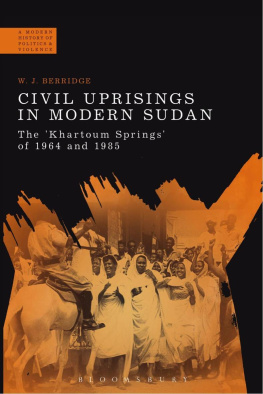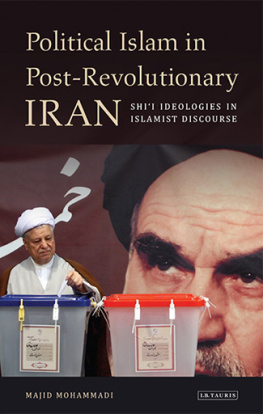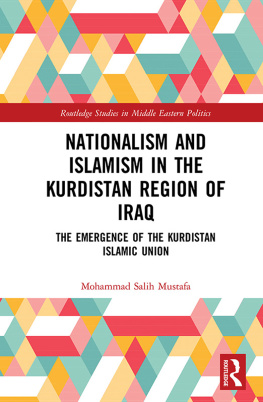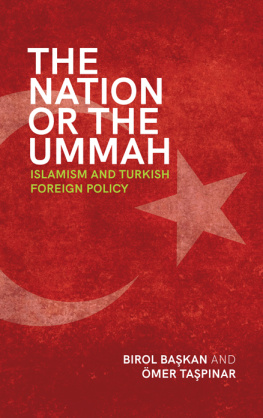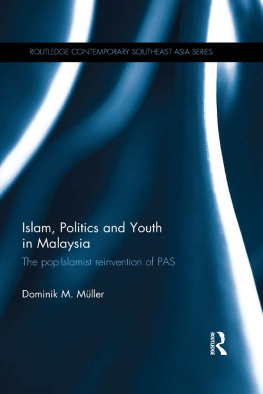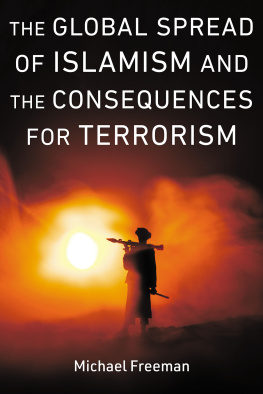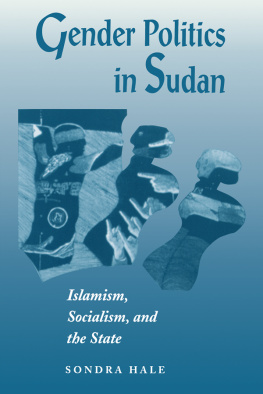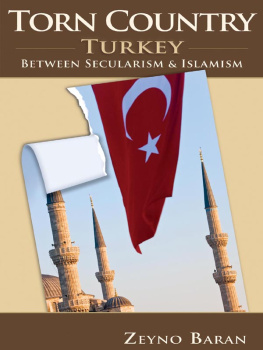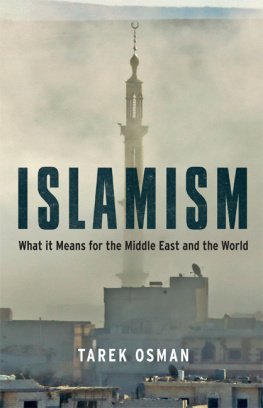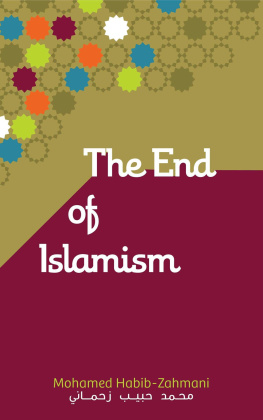THEIR SECOND REPUBLIC
To el-Tag Fadalla
to our sisters Zienab, Ayisha, Tayba, Wsila, Abida, Soud and Smiya
and their children and grandchildrenwe are all made rich by your
compassion, example and generosity, brother.
Their Second Republic
Islamism in the Sudan from Disintegration to Oblivion
ABDULLAHI A. GALLAB
Arizona State University, USA
First published 2014 by Ashgate Publishing
Published 2016 by Routledge
2 Park Square, Milton Park, Abingdon, Oxon OX14 4RN
711 Third Avenue, New York, NY 10017, USA
Routledge is an imprint of the Taylor & Francis Group, an informa business
Copyright Abdullahi A. Gallab 2014
Abdullahi A. Gallab has asserted his right under the copyright, Designs and patents Act,1988, to be identified as the author of this work.
All rights reserved. No part of this book may be reprinted or reproduced or utilised in any form or by any electronic, mechanical, or other means, now known or hereafter invented, including photocopying and recording, or in any information storage or retrieval system, without permission in writing from the publishers.
Notice:
Product or corporate names may be trademarks or registered trademarks, and are used only for identification and explanation without intent to infringe.
British Library Cataloguing in Publication Data
A catalogue record for this book is available from the British Library.
The Library of Congress has cataloged the printed edition as follows:
Gallab, Abdullahi A.
Their second republic : Islamism in the Sudan from disintegration to oblivion / by
Abdullahi A. Gallab.
pages cm
Includes bibliographical references and index.
ISBN 978-1-4094-3572-3 (hardback) -- ISBN 978-1-4094-3573-0 (ebook) -- ISBN 978-1-
4724-0202-8 (epub) 1. Sudan--History--1956- 2. Sudan--Politics and government--1985-
3. Islam and politics--Sudan. 4. Islamic fundamentalism--Sudan. 5. Turabi, Hasan. I.
Title.
DT157.673.G35 2014
962.404--dc23
2013049237
ISBN: 978-1-409-43572-3 (hbk)
ISBN: 978-1-315-55135-7 (ebk)
Contents
Preface
I wrote this book in close relationship with my 2008 work The First Islamist Republic: Development and Disintegration of Islamism in the Sudan. This relationship goes beyond the study of one specific Sudanese phenomenon. In both books, I deal with Islamism, its representation, history, and transformations in the Sudan. In both books, I also deal with the serious problems that led to its demise. But in essence, in both books, I address a manifestation of a sociopolitical experience with local, regional, and global dimensions. The problems I see in contemporary Islamist movementswhich are not monolithicstem from complex developments that came with and relate to the complications of the modern conditions of communities and entities that emerged from the colonial and postcolonial experiences. These conditions are better understood, in my belief, if we can look at them from the following three perspectives. The first is the remnants of the colonial state that reproduces itself by expanding its dominant and coercive institutions. The second is the expansion of the growing of community of the state as it developed into a diversified class of military and bureaucratic elite ideologies that concentrated power in its own hands by identifying each ones political, civil or military group with the state. The third is the different forms and attempts of creating fields of liberation within the realm of civil society that have countered the coercive polity and political order, which has been using the state and its violent capacity as a system of control and performance of power over the society.
Here, the Sudanese experience of Islamism stands as a very important one in the history of the Sudan, the region, and in general. This is not because of its success but because of its total failure. It proved that what has been advocated as al-hal al-Islami (Islam is the solution) or an Islamist state, made within the Islamists concept of Islamism, is itself an unachievable idea neither by default nor by design. It was the savage separation between the state and religion that designated the state as the field of coercion with worse excesses of greedy forms of tamkeen On the one hand, the General/President is supposed to represent this state of savagery to marshal, even coerce, the public into a counter-revolutionary movement against any form of human liberation, right to life, and freedom or political empowerment. On the other hand, religion as exercised in the private sphere is neither a piety reflected in conduct nor judicious comprehensive guidance followed especially by those in power. The Sudanese satire describe this situation by saying talau diyna wa alagou fi l-hiat (they squeezed out our religion and they displayed it at the front of state buildings walls).
The premise of this book might be seen by many to be about asan al-Turabi. That might be true to a certain extent. asan al-Turabi has remained an albatross around the neck of the Islamist movement; the Islamist movement remained as an albatross around his neck too. However, a future book about asan al-Turbi might come sooner or later. asan al-Turabi might be one of the most important political figures in the Sudan and the Muslim world. There might be reasons for some to overlook this fact. Some of these reasons could be attributed to asan al-Turabi himself. Yet, what makes him such an important personality is not his successful theory of value. What makes him important is his failure to see and accept as a moral, religious, political, and civil value the necessity to pay attention to the process by which people as citizens agree according to their free will without coercion or a military coup and the violence that emerges out of it. It is not only violence, antagonism, and exclusion that sustains Islam; but it is solidarity, togetherness, and respect for human dignity and citizens rights that makes it sensitive and responsive to the habits of the heart.
This raises, perhaps, important questions about the Sudan, the country, its people, and its human experience. Since 1821 and until its recent split in 2011, the Sudan was the largest country in Africa and the Middle East with about one million square miles and a human quilt of Muslim, Christian, and other African religions, and, the Sudanese as a nation or historic people have existed within their imagined borders and real, complex past experiences for a far longer time than that. With or without the creation of different borders, confirmation of archeological evidence and the conceptualization of peoplehood, the whole period from time immemorial to the present could be considered as the origin time of the Sudanese. Within and throughout this origin time, the Sudaneses human experiencebefore the founding of the Sudan as a geographical and human spacehas turned in and transformed into a series of complex developments and different forms of interrelationships. The different modes and systems of these developments and their environments have created the Sudanese as a people. Significant human experiences have molded and shaped the Sudanese mutual encounter with time and place, along with other external factors and internal conflicts and tensions, acting together and separately to internally and externally provoke violence. These changes have allowed for systems of domination over nature, over each other, and over means of production and modes of regulation. Moreover, acts embodying all that continued to stimulate, assemble, construct, and weave together of the social, lived, and imagined histories and the material and immaterial lives of the Sudanese. Hence, there is more to the Sudanese experience in its complexity than meets the eye and what skin color alone can capture. At the same time, the Sudan as a geographical space and a meaning that has been reinforced by the establishment of a territory is one form of this Sudanese experience.


